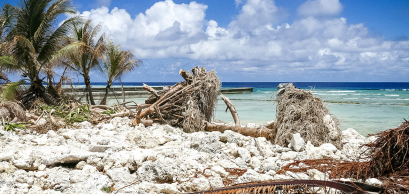Climate change: the Pacific Islands Countries, 7 years after the Paris agreement

Indeed, they are particularly vulnerable to the multiple impacts of climate change (more frequent and more intense natural disasters, rising sea levels, ocean warming and acidification and implications for biodiversity and food security). Within the United Nations, the Pacific Island states carry particular weight in the international negotiations and are often aligned with European positions on climate.
This roundtable will provide an overview of what has changed since COP 21 for the Pacific Islands States regarding climate change: the greater involvement and role of the PICs in the negotiation process, the initiatives that have been taken and implemented in the area, but also the challenges that remain to enable better adaptation, and beyond, ensure an easier access to finance and compensation for loss and damage. New initiatives such as Vanuatu's endaveor to seek an Advisory Opinion on Climate Change from the International Court of Justice (ICJOA) will also be discussed. We will explore how the EU is supporting the PICs' efforts, and why it is important that the two parties work together to tackle climate issues.
This webinar will be held on Zoom, in English.
Programme
- Special message from Bob Loughman, Prime Minister, Republic of Vanuatu
Panelists
- Espen Ronneberg, Adviser, Climate Change and Environmental Sustainability Programme, The Pacific Community
- Stefano Signore, Head of Unit, Climate Change & Sustainable Energy, Nuclear Safety, Directorate-General for International Partnerships, European Commission
- Joachim Claudet, Research Director, Centre for Island Research and Environmental Observatory (CRIOBE), CNRS
- Bakoa Kaltongga, Caretaker Minister of Agriculture, Livestock, Forestry, Fisheries and Biosecurity & Special Envoy on Climate Change for the Pacific, Republic of Vanuatu
Chair : Céline Pajon, Coordinator of the Pacific Islands Program, Center for Asian Studies, Ifri
This webinar is organised in partnership with the Pacific Community.
